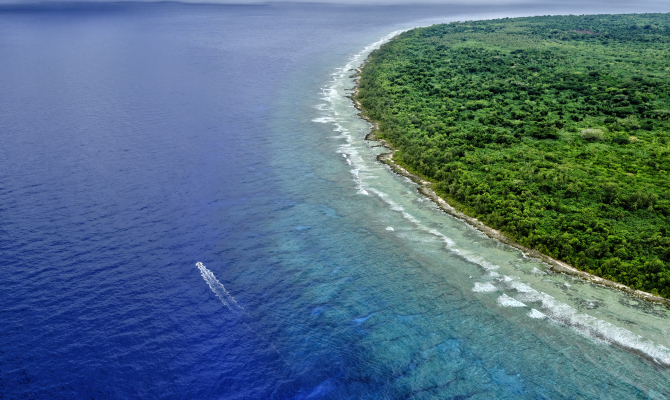
23 June 2025, Apia, Samoa – The Pacific is home to the world’s largest ocean, with a combined Exclusive Economic Zone (EEZ) area of more than 30 million square kilometers – greater than the land area of Canada, China and the United States combined.
Pacific people, as guardians of the world’s largest ocean, have a sacred duty to protect this immense and life-giving territory which defines their cultures, sustains their livelihoods, and holds their heritage. A joint-opening ceremony was conducted this morning to officially kick-off two regional workshops that aim to build and strengthen the capacity and ability of Pacific officials to fulfill that duty.
Held at the Pacific Climate Change Centre hosted at the Secretariat of the Pacific Regional Environment Programme (SPREP) campus in Samoa, the Regional Workshops on Environmental Impact Assessments in Transboundary Waste Movements, and the Climate Data Management and Geospatial Information Technology, were officially opened by SPREP’s Acting Director General, Ms. Easter Chu Shing.
“Before you this week are two paths that lead to the same destination: a resilient Pacific environment. One path confronts a direct threat – the safe management of hazardous waste across our vast ocean territories. The other path equips us with the vision to see future threats and opportunities – harnessing the power of data and technology to plan for a changing climate,” Ms. Chu Shing said.
“These two workshops are two sides of the same coin of stewardship – one about having the right rules and procedures to protect our islands, and the other about having the right tools and knowledge to build its resilience,” she added.
Speaking on behalf of the Government of Samoa, Ms. Lealaisalanoa Frances Brown-Reupena, Chief Executive Officer of the Ministry of Natural Resources and Environment stated that the region is at a critical juncture as the most culturally and ecologically diverse oceanic realm, and a region underpinned by a deep spiritual connection and intimate relationship with, and reliance on, the land and sea, with island homes characterized by high biodiversity values which are at the frontline of the triple planetary crisis of climate change, biodiversity loss, and pollution.
“We need to take urgent action, now more than ever, to address the impacts of this triple threat to our Pacific way of live, our livelihoods, our cultures and traditions, our economies, and most of all, our very existence,” Lealaisalanoa said.
Lealaisalanoa added that the regional workshops give precedence to the transboundary movement of hazardous waste within the region, and the robust environmental due diligence systems required to ensure that the process is executed in an environmentally sound and safe manner, as well as the deployment and timely use of Geospatial Information Systems (GIS) and Data Management tools for effective environmental monitoring, planning, and decision-making.
“These are part and parcel of positive ongoing efforts aimed at planning for and addressing the impacts of the triple planetary crisis within our region, and I am pleased to note that both share the primary elements for facilitating meaningful engagement on these issues – that of capacity building, enhancing awareness and understanding, and encouraging collaboration, knowledge exchange, and experience sharing,” she added.
The EIA for Transboundary Waste Movement workshop tackles a complex and critical challenge of the region’s inconsistent application of environmental assessment principles for waste movement, putting our pristine marine ecosystems at risk. This week, participants will deepen their expertise in EIA as a powerful tool to strengthen decision-making, particularly within frameworks of the essential Waigani and Noumea Convention, regional Conventions that deal with the protection of our Pacific environment.
The Climate Data Management and Geospatial Information Systems brings together country participants who are at the forefront of a data revolution for the Pacific region. Over the course of the week, they will be given the chance to enhance their practical skills in managing and analysing the data that underpins climate adaptation, disaster risk reduction, and sustainable development in order to build the bedrock of evidence upon which the Pacific’s future resilience will be built.
“The true power of these workshops lies not just in the knowledge you will gain, but in the connections you will forge. Whether you are developing a regional mechanism for sharing information on waste shipments or collaborating on best practices for geospatial data, your work is intertwined. The data managed by one group can inform the risks assessed by the other,” Ms. Chu Shing concluded.
The Regional Workshops on Environmental Impact Assessments in Transboundary Waste Movements and Climate Data Management and Geospatial Information Technology is being held from 23 – 26 June 2025. It has been made possible through the support of the European Union-funded African, Caribbean and the Pacific Multilateral Environmental Agreements Phase 3 Programme (ACP-MEA 3), the United Nations Environment Programme Enhancing Climate Information and Knowledge Services for resilience in 5 island countries of the Pacific Ocean (UNEP CIS-Pac 5), the New Zealand Ministry of Foreign Affairs and Trade, and the Emma Luke Earth Observation Centre.
For more information, please contact Mr. Jope Davetanivalu, Director – Environment Governance Programme, at [email protected].